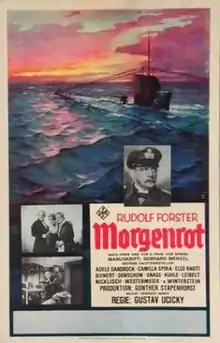Morgenrot (film)
Morgenrot is a 1933 German submarine film set during World War I.
| Morgenrot | |
|---|---|
 | |
| Directed by | |
| Produced by | Gunther Stapenhorst |
| Written by | Gerhard Menzel (Idea: Edgar von Spiegel von und zu Peckelsheim[1]) |
| Starring | |
| Music by | Herbert Windt |
| Distributed by | Universum Film AG (UFa) |
Release date |
|
Running time | 75 minutes |
| Country | |
| Language | German |
Released three days after Adolf Hitler became Reichskanzler, it was the first film to have its screening in Nazi Germany. It became a symbol of the new times touted by the Nazi regime.[2]
The title (literally "morning-red") is the German term for the reddish coloring of the east sky about a half-hour before the sunrise. Dawn was the U.S. title.
It was filmed in Kiel, Schleswig-Holstein, the first German submarine movie made after World War I.
Motifs
The film offered a heroization of death, with the captain explicitly stating that Germans may not know how to live, but they know how to die.[3] In a central scene, the captain of the submarine offers to his men that he and the first officer will go down with the ship in order that they may escape; they refuse on the grounds it will be all or none of them, and the captain glorifies the chance to die with such men, a theme that commonly appeared in Nazi-era films.[4]
The first officer, having learned that the woman he loves is in love with captain, not himself, and another sailor commit suicide to save the others – a common way to resolve love triangles in Nazi films, where the heroic death saves the man from failure.[5]
On the other hand, the mother of one man refuses to rejoice over her son because of the suffering of war – a theme that would not appear in Nazi film.[6]
Cast
- Rudolf Forster - Kapitanleutnant Helmut Liers
- Fritz Genschow - Oberleutnant 'Phipps' Fredericks
- Adele Sandrock - Liers' Mother
- Camilla Spira - GreteJaul, Fredericks' girl
- Paul Westermeier - Seaman Jaul
- Gerhard Bienert - Seaman Böhm
- Friedrich Gnaß - Juraczik
- Franz Nicklisch - Petermann
- Hans Leibelt - Bürgermeister von Meerskirchen
- Else Knott - Helga, Jaul's girl
- Eduard von Winterstein - Hauptmann Kolch
Awards
The National Board of Review of Motion Pictures awarded it with Best Foreign Film for 1933.[7]
References
- E. Baron v. Spiegel at IMDb; Joerg Friedrich Vollmer: Imaginaere Schlachtfelder. Kriegsliteratur in der Weimarer Republik – eine literatursoziologische Untersuchung. PhD Thesis, Freie Universitaet Berlin 2003 (Chapter 5, p 413) Online Edition
- "filmportal.de". Archived from the original on 2012-02-04. Retrieved 2005-09-26.
- Baird, p. 8
- Leiser, pp. 20
- Leiser, pp. 20–21
- Leiser, pp. 21
- "New York Times: Morgenrot (1933)". NY Times. Retrieved 2010-10-31.
Bibliography
- Baird, Jay W. (1974). The Mythical World of Nazi War Propaganda. University of Minnesota Press. ISBN 978-0-8166-0741-9.
- Leiser, Erwin (1975). Nazi Cinema. Macmillan. ISBN 978-0-02-570230-1.